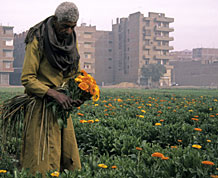SOLID WASTE MANAGEMENT
Purpose
In Egypt, more than 15 million tons of waste are generated yearly, with an annual increase of 3.4%. This huge amount is not matched by sufficient resources and capacities to manage waste in an effective and environmentally sound manner. Existing efforts to address the problem primarily focus on dumping or burning, both of which are not sustainable and are causing severe environmental and health problems for the urban population.
Integrated waste management approaches are increasingly focusing on the recovery of the valuable resources that exist in waste. A value chain approach to waste management focusing on composting and recycling can contribute to the preservation of scarce resources and the reduction of greenhouse gases. In Egypt, there is a long- standing tradition of informal recyclers recovering resources out of waste, a fact that presents a great opportunity for implementing integrated waste management strategies.
The SWM Component is executed through the Participatory Development Programme in Urban Areas (PDP). The four-year component is supported by funds from the Bill & Melinda Gates Foundation and managed by GIZ through in cooperation with Qalyubeya Governorate.
Objectives
The SWM component of the PDP aims to establish an integrated and community-based Solid Waste Management System in two cities in Qalyubeya Governorate. The component will strive to achieve five key objectives:
1. Â Â Â Â Â Developing an integrated solid waste management strategy through the participation of all stakeholders.
2. Â Â Â Â Â Raising awareness among the stakeholders on the existing problems and their roles and responsibilities for the improvement of the SWM system.
3. Â Â Â Â Â Building the capacity of concerned stakeholders on sustainable and environmentally sound methods of managing waste.
4. Â Â Â Â Â Improving living and working conditions of informal waste collectors and recyclers.
5. Â Â Â Â Â Establishing sustainable structures for the recovery and recycling of waste.
The project aims to create livelihood opportunities for the urban poor in the selected areas and improve the overall environmental conditions creating a better living environment.
